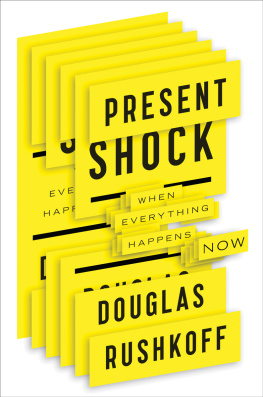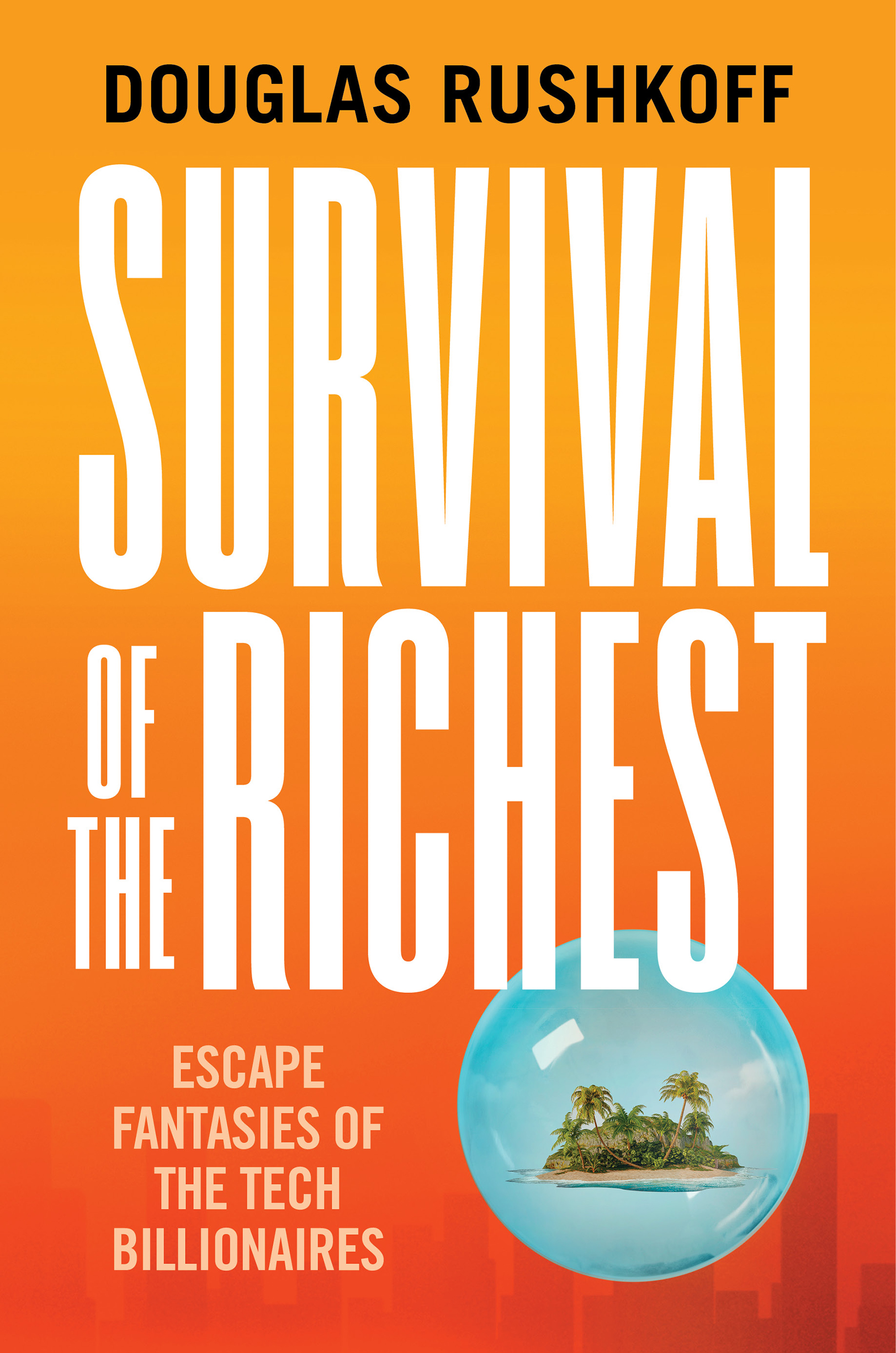Contents
Guide
Survival of the Richest
ESCAPE FANTASIES OF THE TECH BILLIONAIRES
DOUGLAS RUSHKOFF

For Mark Filippi, Michael Nesmith, and Genesis Breyer P-Orridge. Wish you were here.
Contents
- BILLIONAIRE BUNKER STRATEGIES
- ALWAYS HAVE AN EXIT STRATEGY
- YOU ARE SAFE IN YOUR TECHNO-BUBBLE
- OUT OF SIGHT, OUT OF MIND
- SCIENTISM OVER MORALITY
- DEHUMANIZE, DOMINATE, AND EXTRACT
- WHEN YOU CAN GO NO FURTHER, GO META
- IF YOU COULD JUST PUSH A BUTTON
- WE ARE AS GODS
- TO SAVE THE WORLD, SAVE CAPITALISM
- RESISTANCE IS FUTILE
- HOISTED BY THEIR OWN PETARD
- EVERYTHING COMES BACK
Survival of the Richest
got invited to a super-deluxe resort to deliver a speech to what I assumed would be a hundred or so investment bankers. It was by far the largest fee I had ever been offered for a talkabout a third of my annual salary as a professor at a public collegeall to deliver some insight on the future of technology.
As a humanist who writes about the impact of digital technology on our lives, I am often mistaken for a futurist. And Ive never really liked talking about the future, especially for wealthy people. The Q & A sessions always end up more like parlor games, where Im asked to opine on the latest technology buzzwords as if they were ticker symbols on a stock exchange: AI, VR, CRISPR. The audiences are rarely interested in learning about how these technologies work or their impact on society beyond the binary choice of whether or not to invest in them. But money talks, and so do I, so I took the gig.
I flew business class. They gave me noise-canceling headphones to wear and warmed mixed nuts to eat (yes, they heat the nuts) as I composed a lecture on my MacBook about how digital businesses could foster circular economic principles rather than doubling down on extractive growth-based capitalismpainfully aware that neither the ethical value of my words nor the carbon offsets I had purchased along with my ticket could possibly compensate for the environmental damage I was doing. I was funding my mortgage and my daughters college savings plan at the expense of the people and places down below.
A limo was waiting for me at the airport and took me straight out into the high desert. I tried to make conversation with the driver about the UFO cults that operate in that part of the country and the desolate beauty of the terrain compared with the frenzy of New York. I suppose I felt an urge to make sure he understood Im not of the class of people who usually sit in the back of a limo like this. As if to make the opposite point about himself, he finally disclosed that he wasnt a full-time driver but a day trader a bit down on his luck after a few poorly timed puts.
As the sun began to dip over the horizon, I realized I had been in the car for three hours. What sort of wealthy hedge fund types would drive this far from the airport for a conference? Then I saw it. On a parallel path next to the highway, as if racing against us, a small jet was coming in for a landing on a private airfield. Of course.
Just over the next bluff was the most luxurious yet isolated place Ive ever been. A resort and spa in the middle of, well, nowhere. A scattering of modern stone and glass structures were nestled into a big rock formation, looking out on the infinity of the desert. I saw no one but attendants as I checked in and had to use a map to find my way to my private pavilion for the night. I had my own outdoor hot tub.
The next morning, two men in matching Patagonia fleece came for me in a golf cart and conveyed me through rocks and underbrush to a meeting hall. They left me to drink coffee and prepare in what I figured was serving as my green room. But instead of me being wired with a microphone or taken to a stage, my audience was brought in to me. They sat around the table and introduced themselves: five super-wealthy guysyes, all menfrom the upper echelon of the tech investing and hedge fund world. At least two of them were billionaires. After a bit of small talk, I realized they had no interest in the talk I had prepared about the future of technology. They had come to ask questions.
They started out innocuously and predictably enough. Bitcoin or Ethereum? Virtual reality or augmented reality? Who will get quantum computing first, China or Google? But they didnt seem to be taking it in. No sooner would I begin to explain the merits of proof-of-stake versus proof-of-work blockchains than they would move to the next question. I started to feel like they were testing menot my knowledge so much as my scruples.
Eventually, they edged into their real topic of concern: New Zealand or Alaska? Which region will be less impacted by the coming climate crisis? It only got worse from there. Which was the greater threat: climate change or biological warfare? How long should one plan to be able to survive with no outside help? Should a shelter have its own air supply? What is the likelihood of groundwater contamination? Finally, the CEO of a brokerage house explained that he had nearly completed building his own underground bunker system, and asked, How do I maintain authority over my security force after the event? The Event. That was their euphemism for the environmental collapse, social unrest, nuclear explosion, solar storm, unstoppable virus, or malicious computer hack that takes everything down.
This single question occupied us for the rest of the hour. They knew armed guards would be required to protect their compounds from raiders as well as angry mobs. One had already secured a dozen Navy SEALs to make their way to his compound if he gave them the right cue. But how would he pay the guards once even his crypto was worthless? What would stop the guards from eventually choosing their own leader?
The billionaires considered using special combination locks on the food supply that only they knew. Or making guards wear disciplinary collars of some kind in return for their survival. Or maybe building robots to serve as guards and workersif that technology could be developed in time.
I tried to reason with them. I made pro-social arguments for partnership and solidarity as the best approaches to our collective, long-term challenges. The way to get your guards to exhibit loyalty in the future is to treat them like friends right now, I explained. Dont just invest in ammo and electric fences, invest in people and relationships. They rolled their eyes at what must have sounded to them like hippie philosophy, so I cheekily suggested that the way to make sure your head of security doesnt slit your throat tomorrow is to pay for his daughters bat mitzvah today. They laughed. At least they were getting their moneys worth in entertainment.
I could tell they were also a bit annoyed. I wasnt taking them seriously enough. But how could I? This was probably the wealthiest, most powerful group I had ever encountered. Yet here they were, asking a Marxist media theorist for advice on where and how to configure their doomsday bunkers. Thats when it hit me: at least as far as these gentlemen were concerned, this was a talk about the future of technology.







